Key takeaways:
- Understanding music contracts is essential for financial success; key terms like royalties, advances, and rights can significantly impact an artist’s career.
- Common pitfalls include overlooking exclusivity clauses, unclear recoupment terms, and poorly defined termination clauses, which can trap artists in unfavorable agreements.
- Negotiating contracts should be approached as a collaborative effort; clear communication and prioritizing shared goals can lead to better outcomes for both parties.
- Utilizing resources such as online legal guides, musician communities, and consulting with entertainment lawyers can empower artists to make informed decisions regarding contracts.
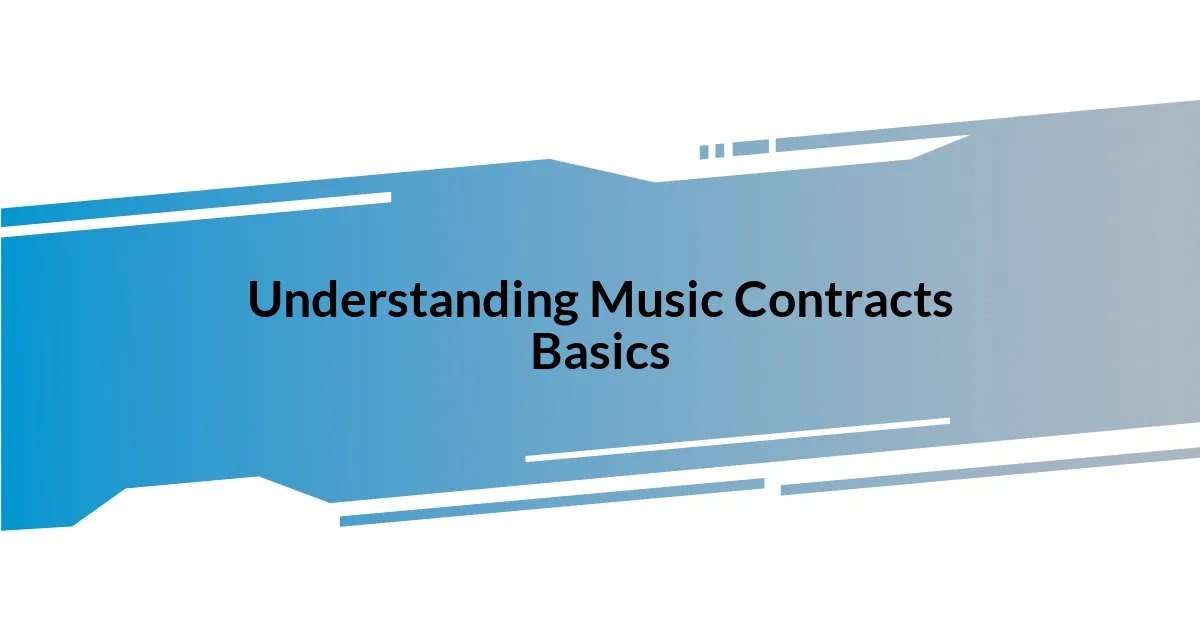
Understanding Music Contracts Basics
Diving into music contracts can feel a bit daunting at first, but think of it as reading the owner’s manual for your dream instrument. I remember my first contract; I was so eager, yet so overwhelmed by the jargon. Terms like “royalties” and “advances” floated over my head—what do they even mean? Understanding how money flows in the music industry is crucial, and these basics set the stage for your financial success.
One aspect that often catches many artists off guard is the type of contract they’re signing. It’s not just about what’s on paper; it’s about knowing who holds the power, right? For example, I once signed a deal that favored the label heavily, and it took me months to realize how much control I had given away. Contracts can dictate your future, so take the time to understand the implications of every clause.
Lastly, never underestimate the importance of clarity in your agreements. The phrases you skim over could end up being the keys to your financial freedom or your creative downfall. I’ve learned the hard way that asking the right questions, such as “What happens if I want to leave this contract?” can make all the difference. Want to avoid surprises? Make sure your agreement lays everything out clearly before you sign on the dotted line.
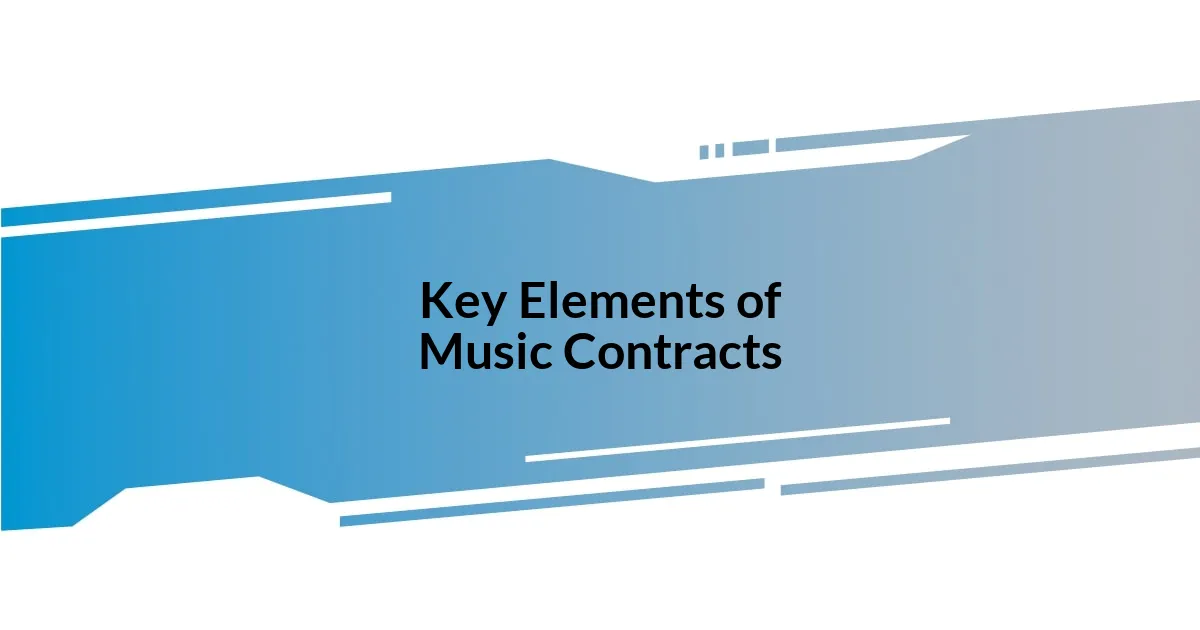
Key Elements of Music Contracts
When navigating the world of music contracts, several key elements are essential to understand. In my experience, the clarity of terms can significantly influence an artist’s career trajectory. For instance, I once missed a key clause that limited my ability to collaborate with other artists, which taught me the hard way that seemingly minor details can have major implications.
Here are some critical components to look for in music contracts:
- Royalties: Understand how they’re calculated and when you’ll receive them. I learned the difference between mechanical and performance royalties only after signing a deal that buried me in paperwork.
- Advances: This upfront payment can feel like a windfall, but I came to realize it’s recoupable, meaning you pay it back with future earnings.
- Territory: Know where the contract applies—local, national, or global. I once signed a deal that unexpectedly restricted my music outside the US.
- Contract Duration: Pay attention to how long you’re locked into an agreement. I’ve found that some contracts felt like shackles instead of opportunities.
- Rights: It’s crucial to understand who owns your music and the scope of those rights. I naively thought I would retain ownership, only to discover that my recording label had other plans.
These elements can make or break your experience in the music industry, and paying close attention to detail is vital to safeguarding your creative journey.
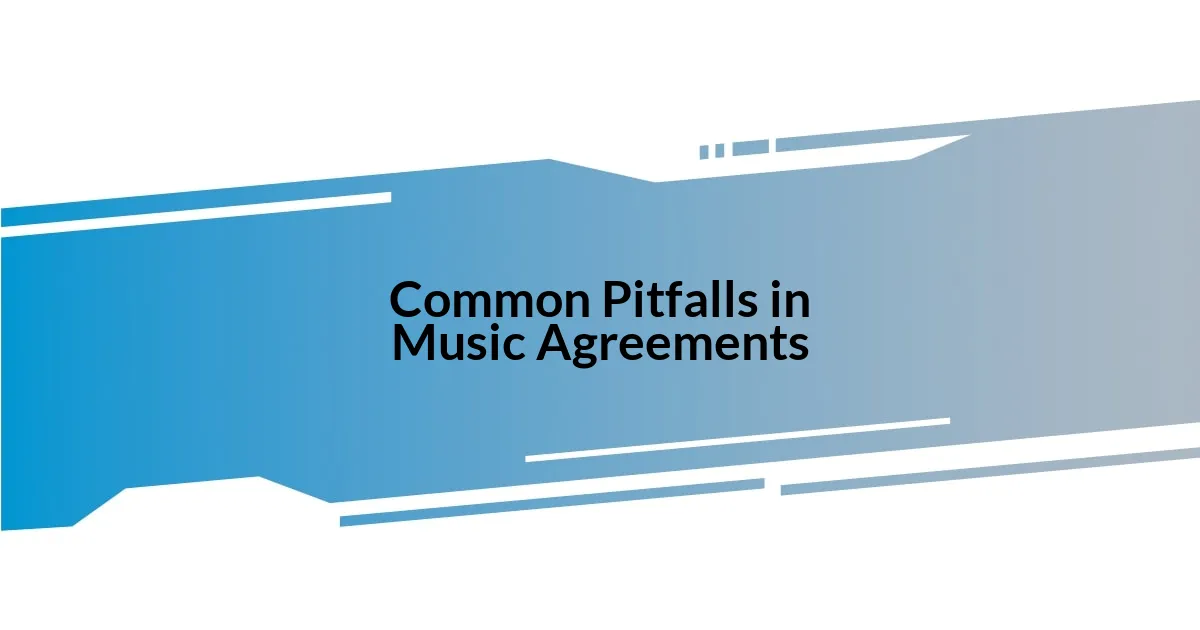
Common Pitfalls in Music Agreements
One of the most common pitfalls I’ve encountered in music agreements is overlooking “exclusivity” clauses. These clauses often prevent you from working with anyone else during the length of the contract. I remember a time when I was so excited to sign a deal that I didn’t notice I was giving up the right to collaborate with a musician I admired. That opportunity slipped away, leaving me wondering what could have been if I had read the fine print carefully.
Another frequent trap is failing to define the terms of “recoupment.” This refers to the process where the label takes back the advances they’ve given you from your future earnings. It can feel like a financial chokehold if you’re not prepared— believe me, I found out the hard way. After signing a deal, I was shocked to discover that my anticipated earnings were significantly lower because of all the costs the label was recouping, leaving little for me.
Many artists also ignore the termination clauses in their contracts. This can be a huge mistake. The first time I faced this, I realized too late that I had no clear path out of an agreement that wasn’t working for me. It left me feeling stuck, and I learned that understanding how to terminate a contract is as essential as knowing how to start one.
| Pitfall | Description |
|---|---|
| Exclusivity Clauses | Prevents collaboration with others during the contract term. |
| Recoupment Terms | Future earnings are reduced as advances and costs are taken back by the label. |
| Termination Clauses | Defines how to exit a contract; lacking clarity can keep you trapped. |
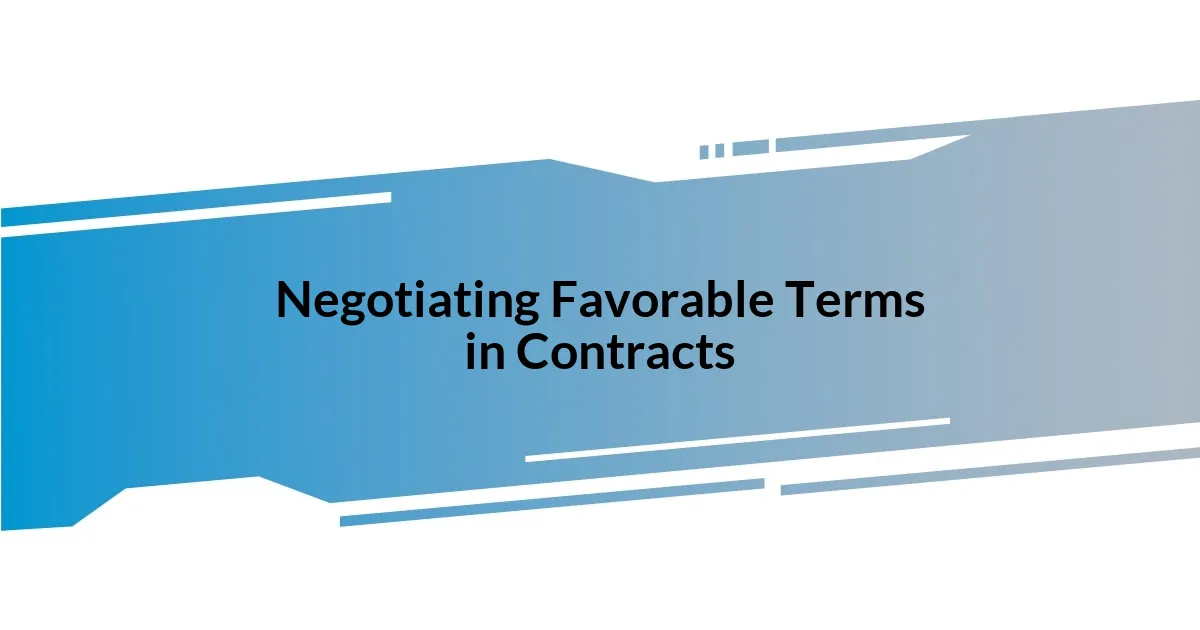
Negotiating Favorable Terms in Contracts
Negotiating favorable terms in contracts can feel overwhelming, but it’s a crucial skill for any artist. I remember a negotiation where I felt hesitant to push back on the initial royalty percentages. It was only after a mentor encouraged me to advocate for what I deserved that I realized the power of my voice. Asking the right questions can truly change the landscape of a deal—why settle for less when you have the opportunity to secure a better future for your music?
It’s vital to approach negotiations as a collaborative effort rather than a battle. I found that building rapport with the other party not only fostered a smoother negotiation process but also opened doors to flexibility on both sides. When I led discussions with a genuine interest in their goals, I noticed they were more inclined to meet me halfway on terms like marketing support and licensing rights. Can you imagine if I had gone in with an adversarial mindset? It would have left both parties less satisfied and restricted the potential for a beneficial partnership.
Remember, the best negotiations are rooted in clear communication. I once entered a meeting with a long list of demands but quickly learned the value in prioritizing my needs and framing them in a way that appealed to the other side. Instead of bombarding them with requests, I focused on shared objectives. This strategy led to a deal that not only met my needs but also left the label feeling excited about our collaboration. Isn’t it amazing how clarity can unlock mutual success?
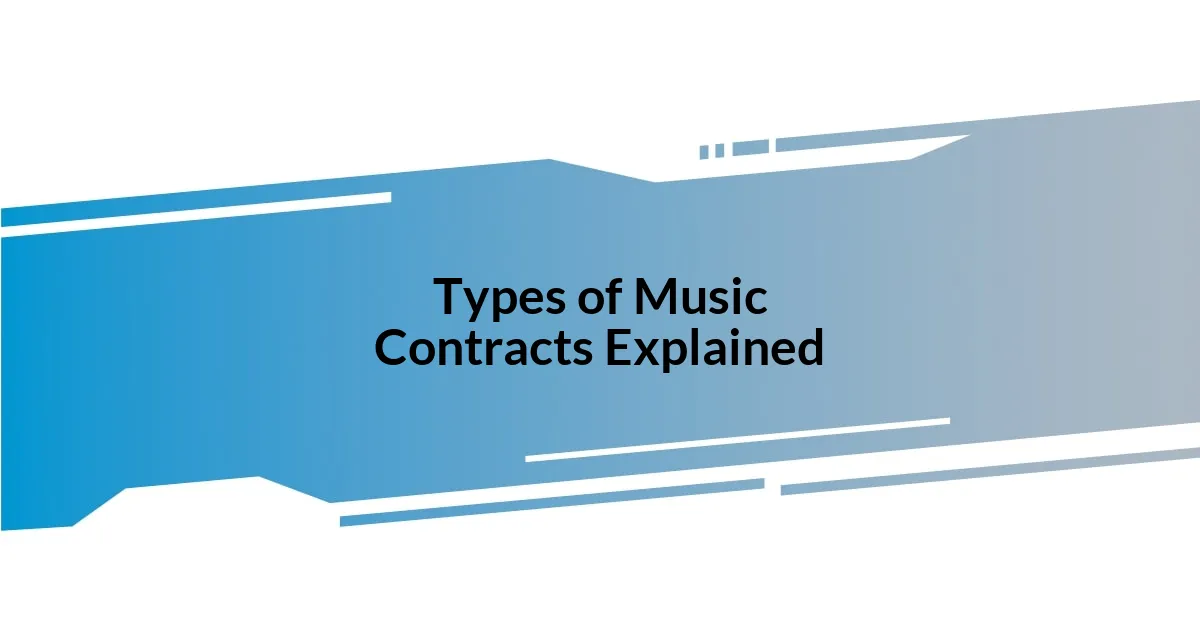
Types of Music Contracts Explained
Music contracts come in various forms, each with its specific implications that every artist should understand. For instance, recording contracts are among the most common, defining the relationship between an artist and a label regarding the production and distribution of music. I remember being thrilled at the prospect of finally having my music released, but I quickly realized that the terms dictated everything from my artistic control to the financial benefits I could expect.
Another type that often flew under my radar initially is the publishing contract. This governs how your songs are used and ensures that you receive royalties from their performance and reproduction. I learned this the hard way when a song I penned was featured in a commercial. Had I secured a solid publishing deal upfront, the royalties would have made a substantial difference in my income. It’s the little details here that can have a long-lasting impact.
Lastly, live performance agreements should never be overlooked. These contracts outline the terms for gigs, including payment, performance length, and even merchandise sales. I had a situation once where I agreed to a seemingly good deal only to find that the fees for merchandise sales were excessively high—clearly defined terms would have saved me a headache. Isn’t it fascinating how each type of contract opens a different door in the industry? Understanding these distinctions can be crucial in navigating your career.
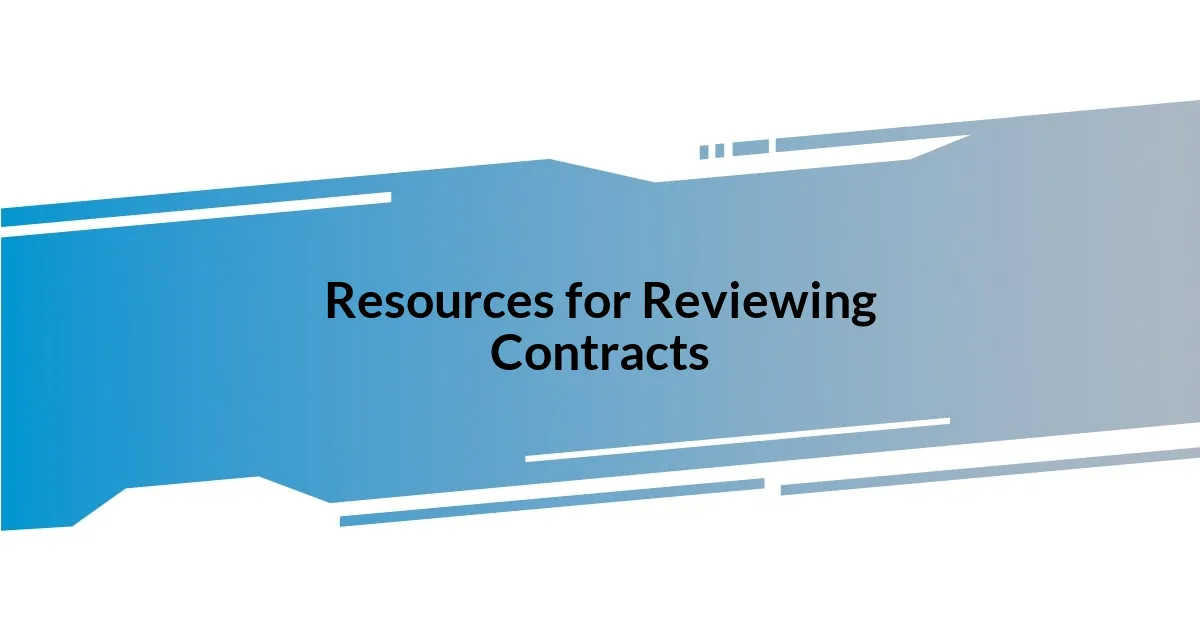
Resources for Reviewing Contracts
When it comes to reviewing contracts, having the right resources at your fingertips can be a game-changer. One resource I found invaluable was the Music Lawyer Online, a website that provides articles and guides specifically tailored to musicians. I remember spending countless hours poring over their content, feeling more empowered with each reading. The clarity they provide on contract clauses helped me understand complex legal jargon that once felt like a foreign language.
Additionally, I can’t stress enough the importance of joining online forums or groups for musicians, like The DIY Musician Community on Facebook. Being able to share experiences with others and seek advice in real time has really opened my eyes to the nuances of contracts—there’s something comforting about knowing you’re not alone in this journey. I often found myself chuckling at the humorous anecdotes shared by fellow musicians, and each laugh came with a learning point that made me rethink my own approach.
Lastly, don’t underestimate the power of consulting with a local attorney who specializes in entertainment law. I recall a time when I was ready to sign a contract that seemed favorable but, thanks to a brief consultation with a knowledgeable lawyer, I discovered a hidden clause that could have affected my royalties significantly. It serves as a reminder that investing in legal advice is not just an expense; it could be one of the best decisions for your career. How can you put a price on your peace of mind and future success?